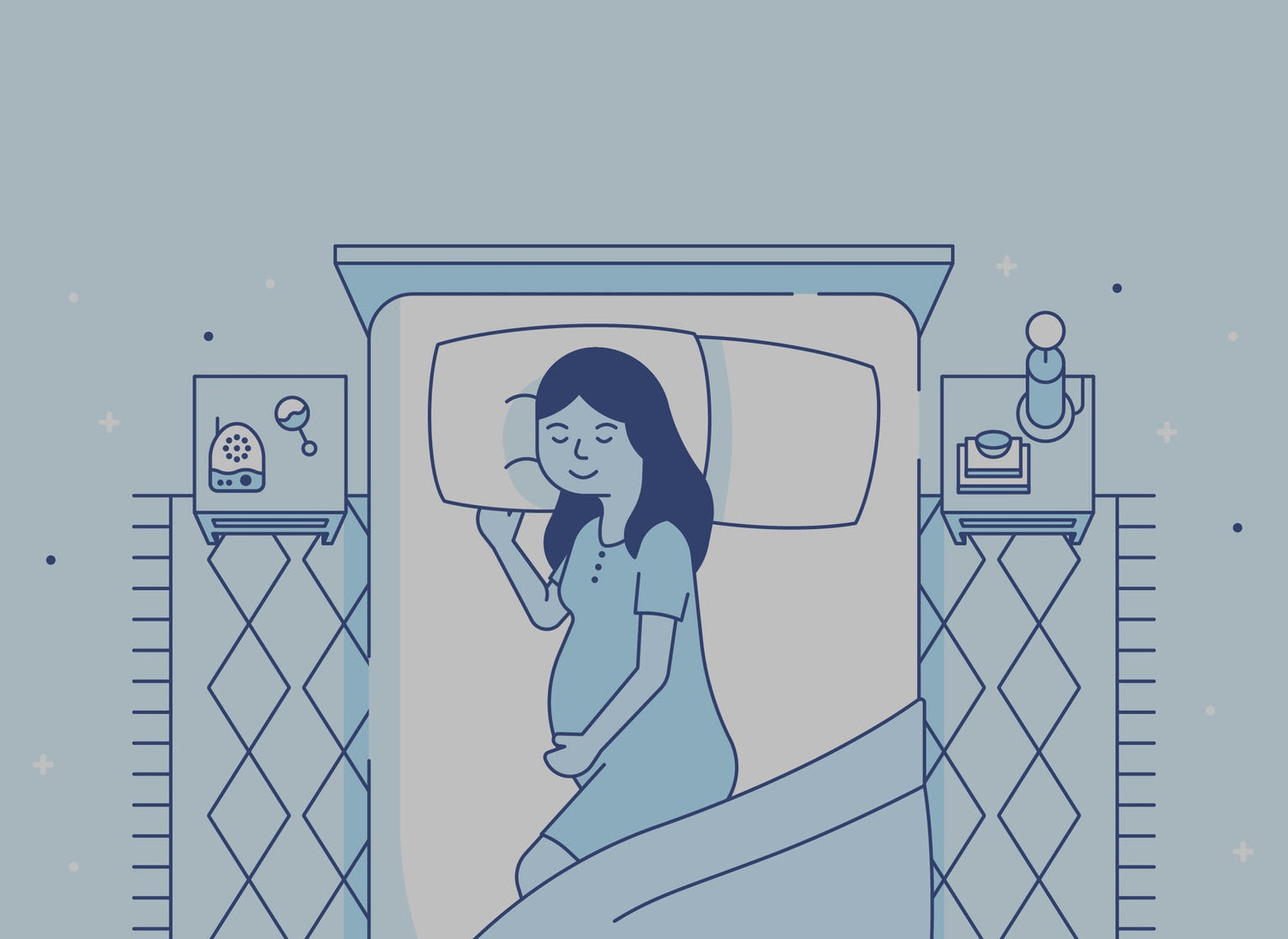*This article is for general information purposes only and is not intended as medical or other professional advice. Consult your physician in the event that you require any pregnancy-related medical advice.
It’s well known that new parents will be kept awake many a night, but you may not realize that this can start well before your baby is born. Expecting mothers report all sorts of sleeping issues, from not being able to get comfortable to twitchy muscles to nightmares.
The symptoms vary from person to person and can depend on what stage of the pregnancy you are in. To help you get some much needed rest, we’ll go through each trimester and examine common sleeping problems and how to sleep while pregnant.
Common Pregnancy Sleeping Problems
As early as the first trimester, women can start to experience sleep problems. These issues can be both physiological and psychological, caused by the stress pregnancy puts on your body and mind. As you progress in your pregnancy, you may notice that your experience changes and that some months are more difficult than others. Everyone is different, but here are some of the more common sleeping problems and what you can do to solve them.

First Trimester
Increased Trips to the Bathroom
You may notice that as your body begins to produce more progesterone you will need to visit the bathroom more often. This, coupled with the fact that your uterus is growing (and pushing against your bladder), could mean more frequent urination.
Tip: Avoid drinking too many fluids after 6PM and completely avoid caffeine after lunch time.
Frequent Headaches
Unfortunately, fluctuating hormones during the first trimester also tend to cause strong headaches. When progesterone skyrockets, your blood vessels dilate causing headaches so bad they may keep you up at night.
Tip: Some women may find that taking acetaminophen can help with pain management. Be sure to check with your doctor before taking any medication. You can also try placing a cool towel on your forehead to cause the blood vessels to contract.

Sore Breasts
As your breasts start preparing for milk production they will likely become sore. High levels of estrogen and the presence of hCG (human chorionic gonadotropin) can both contribute to this. Those who are used to sleeping on their stomach may find it hard to sleep.
Tip: Try sleeping on your side and using a body pillow to take some of the pressure off of your breasts. You can also try taking a hot bath before bed to help calm your body and get ready to drift off to sleep.
Nausea
What is commonly known as “morning” sickness can strike in the evening or nighttime hours too. If it occurs while you’re trying to sleep, it can be very difficult to rest.
Tip: Keep saltine crackers on your nightstand so that you can grab them if your stomach feels off. Having food in your stomach can help fend off nausea, making it easier to fall asleep.

Disturbed Sleep Patterns
It’s very common for women to experience extreme lethargy during the day throughout their first trimester. This is not only due to the rise in progesterone, but because your body is utilizing calories to grow the fetus inside of you.
Tip: You should try to fix your sleep schedule by getting up with the sun, having an early morning exercise and having set sleep/wake hours. You will likely need to nap, but keep them between 2-4PM so you don’t have trouble sleeping that night.
Second Trimester
Cramping
Muscle cramps — especially leg cramps are common during the second trimester due to a calcium imbalance in the body. These cramps can come out of nowhere and wake you up in the middle of the night.
Tip: Drinking soda and other carbonated beverages has been reported to decrease the amount of calcium your body is able to metabolize, fueling the imbalance. Avoid drinks like soda and sparkling water if you’re having trouble with cramps.

Heartburn
Another unpleasant issue that’s common in the second trimester? Heartburn. Since the baby is putting pressure on your stomach, acid reflux can develop. Lying in bed at night can exacerbate this issue and keep you up at night.
Tip: Try to stay upright in the four hours leading up to bedtime. This will help you digest your food and keep your stomach acids inside your stomach. You can try eating larger breakfasts and smaller dinners and avoid spicy, fried and acidic foods. This includes citrus fruits, tomatoes, coffee and juice.
Intense Dreams
As your due date approaches, you may start to experience anxiety. This could be about the birthing process, future parenting skills or a combination of things. Anxiety can produce vivid, sometimes troubling dreams which can keep you up at night.
Tip: Create a relaxing bedtime ritual that you can perform each night. You can try meditation, relaxation techniques, prenatal yoga or whatever gets your mind at ease. You should consult your medical provider prior to participating in any strenuous physical activity. If these dreams are severely impacting your sleep, you may consider seeing a counselor to discuss things you’re worried about.

Inability to Get Comfortable
As your belly grows and your body changes, you may find it’s not as easy to settle in for sleep. Doctors will recommend that you don’t sleep on your back, but many people find it’s too uncomfortable to sleep on their belly. You are usually advised to sleep on your side, although that may be difficult for those who aren’t used to it.
Tip: Use a body or pregnancy pillow to help trick your body into thinking it’s sleeping the way that you’re used to. Many people like to place a pillow on either side of the belly while sleeping on their side, putting their weight on these pillows but not squishing the belly.
Third Trimester
Restless Leg Syndrome
It’s common to experience restless leg syndrome while pregnant. Restless leg syndrome (RLS) is the irresistible urge to move your legs, similar to the strange sensation of “pins and needles”. This could be due to low iron or folate counts in the body, and can certainly lead to poor sleep.
Tip: Before bed, give yourself a leg massage to get the blood flowing. Evening walks have also been shown to help ease RSL. You can also try incorporating more leafy greens and iron-rich foods into your diet.

Breathing Problems
Pregnant women will often experience breathing issues while sleeping in their third trimester. This is due to the weight gain that comes along with pregnancy. It’s especially common in women who were overweight or obese before becoming pregnant.
Tip: If you have a stuffy nose, a nasal spray or neti pot can help clear out your nasal passages. In extreme cases, pregnant women who are having issues breathing may want to see a sleep pathologist. They might prescribe a machine that keeps your airways open to deliver adequate oxygen to you and the baby.
Back Pain
Pelvic and other body changes quite often lead to back pain during pregnancy. For obvious reasons, this can make it difficult to both fall asleep and stay asleep.
Tip: Place pillows between your knees, under your belly and behind your back to take the stress of your lower back. You can also try using a pregnancy pillow. During the day, be sure to stretch frequently or try prenatal yoga.

Anxiety
As we mentioned earlier, anxiety is unfortunately a part of many pregnant women’s lives. There is a major change about to occur in your life and there are many preparations to be made. Anxiety can lead to insomnia and overall poor sleep.
Tip: Keep a written list of all of the things you need to get done and check them off one by one. This will help you feel more in control of your situation. Before bed, sip some chamomile tea and make sure the lighting and environment in your room is as comfortable as possible.
More Tips for Sleeping During Pregnancy
A combination of these issues can make it difficult to get comfortable and ultimately get to sleep. Since sleep is arguably even more important when you’re expecting, here are some tips to help you snooze better.

- Start a relaxing bedtime routine. Light music and a warm bath can help.
- Avoid electronic devices for at least an hour before bedtime. The blue light can send signals to your brain to stay awake.
- Avoid sugar and caffeine past three in the afternoon.
- Don’t watch the clock if you wake up in the night. Turn it facing away from you if that helps.
- Make sure your room’s sleeping temperature is comfortable and your room is kept dark during sleeping hours.
- Try a sleep app or a podcast for sleep. There are tons that offer meditation or ambient sound.
- Try not to stress about losing sleep. Worrying about not being able to sleep can often ensure you stay awake longer.
- Use aromatherapy to help you sleep. Lavender is great for helping you doze off.
- If you’re unable to sleep, get out of bed and do something relaxing (listen to music, read, meditate) rather than lying awake.
- If you need to, talk to your doctor about natural sleep aids. Don’t take any unless advised by your doctor.
The Best (and Worst) Sleeping Positions for Pregnancy
There are certain ways to sleep that are recommended by health professionals because of the way the positions move the baby inside your body. People usually have a favorite sleeping position, so you may find it hard to sleep in one that’s not yours. However, you can use pillows to prop your body and ensure maximum comfort while drifting off.

Sleeping on Your Back
Worst: This is a common way that people sleep, which is unfortunate because it can cause issues during pregnancy. Sleeping on your back can cause back aches, breathing problems and digestive issues. It has even been known to decrease circulation to your heart and the baby since your abdomen will rest on your intestines and major blood vessels.
Sleeping on Your Stomach
Better: While there are less adverse impacts of laying on your stomach, it can be difficult and uncomfortable to do so once you’re further along in the pregnancy. One thing many people who are stomach sleepers do is buy a pregnancy pillow, so they feel like they are sleeping on their stomach but without putting pressure on the belly.
Sleeping On Your Side
Best: Sleeping on your side is the most common and comfortable sleeping position while pregnant. Sleeping on your left side is recommended because your liver is on the right side of your body. This positioning helps keep your uterus off that organ and can help improve circulation and allow the best blood flow to your vital organs and baby.
If you’re finding it difficult to sleep while you’re expecting, try some of the tips recommended here. You can also try creating the ultimate environment for sleep by making sure you have comfortable sheets and supportive pillows. Use these to create a comfortable nest so that you can rest easy.












